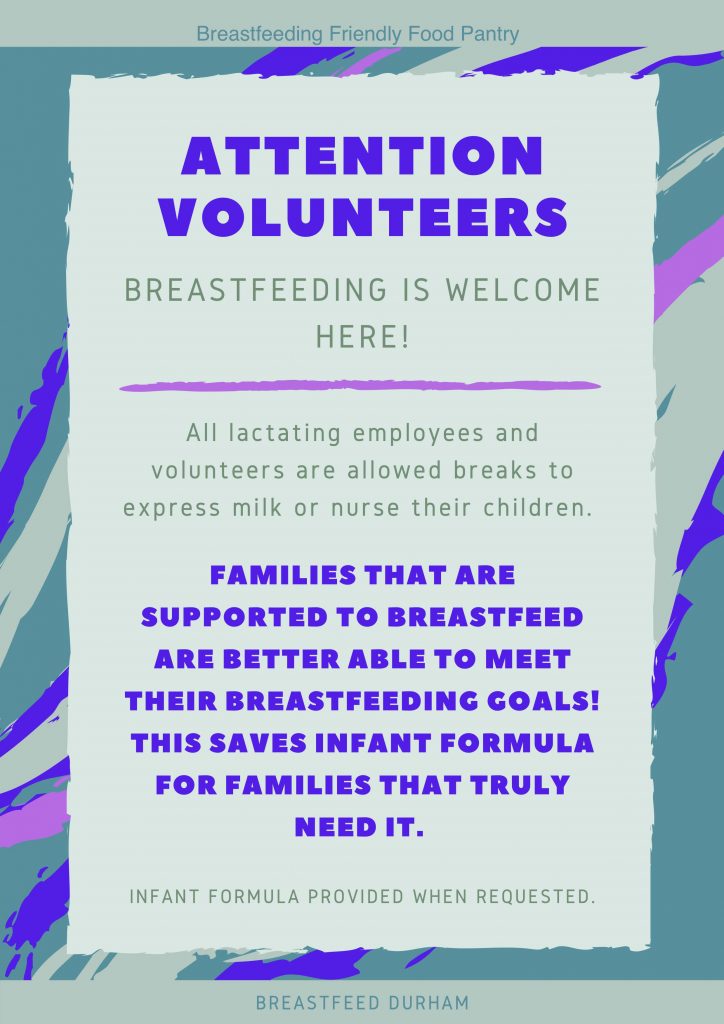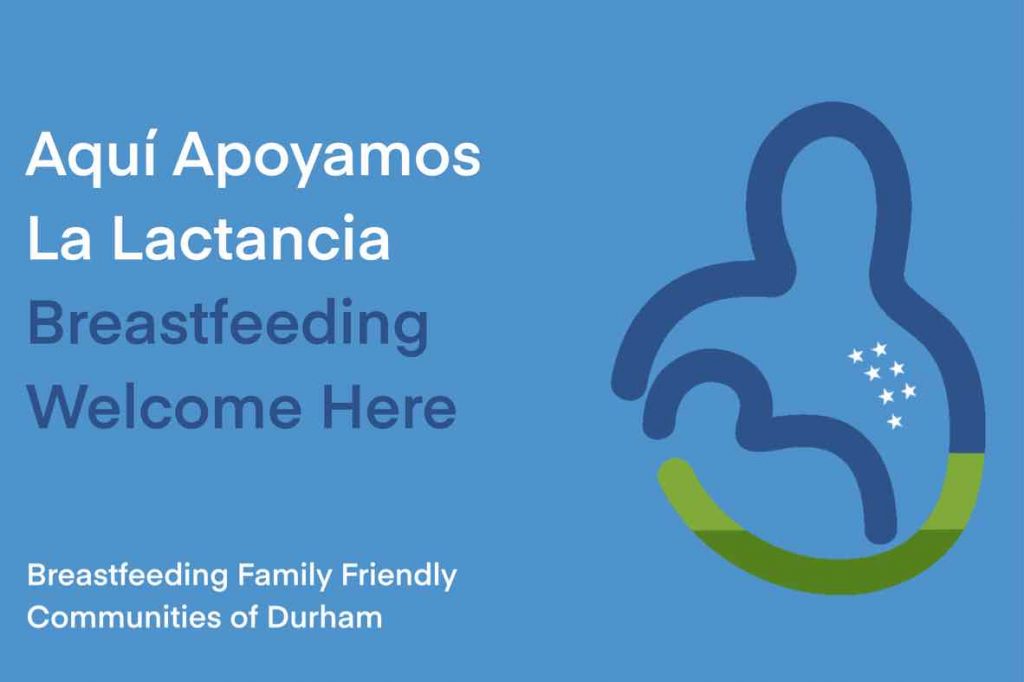Families that are supported to breastfeed are better able to meet their breastfeeding goals, and this saves needed infant formula for those families that truly need it.
These guidelines are for managers, employees, volunteers, partner organizations, and those who handle food donations, work directly with the public, and conduct educational programs in food pantries. Breastfeeding Family Friendly Food Pantries provide a welcoming environment that is friendly, accepting, and supportive of breastfeeding families. Food pantries play an important role in supporting infant feeding. Food pantry staff and volunteers should understand how to support families choosing to breastfeed. Decisions that the food pantry makes in regards to infant feeding have an impact on the family’s success in meeting breastfeeding goals.
*Guidelines adapted from the Colorado Breastfeeding Coalition guidelines
Food Pantries Play a Critical Role
Many parents wonder if they have enough milk for their infants, even when the infant is growing and thriving. Providing formula to a family that is already successfully breastfeeding, or to a family that has not requested the formula, can undermine breastfeeding. Food pantries can help breastfeeding families by providing information about breastfeeding resources to support the parents’ decision to breastfeed.
Food pantries play a critical role in supporting breastfeeding families. It is important for food pantry staff and volunteers to understand how to support families choosing to breastfeed. It also is important for administrators at the food pantries to understand how to support breastfeeding staff and volunteers by providing them with adequate break time and space to express their milk or breastfeed their babies while working their shifts.
In the United States, nearly 90% of families choose to start breastfeeding. However, they need support from the community to continue breastfeeding their babies exclusively and for longer periods of time. In addition, studies show that families with lower incomes also receive less breastfeeding support, and they experience more barriers; thus, they often tend to stop breastfeeding earlier. Welcoming breastfeeding at the Food Pantry can provide the much needed support that the family needs to continue to breastfeed.
Breastfeeding Is Important
All major medical organizations promote breastfeeding for optimal child health and development and recommend breastfeeding for as long as the parent and child want to continue. The American Academy of Pediatrics (AAP) recommends that all babies receive only human milk for their first six months. This is called exclusive breastfeeding, meaning that the babies receive the healthiest choice: only human milk and no infant formula, solid foods, or water. It allows babies to stay healthier and promotes growth.
- Breastfeeding saves lives! Human milk is always clean; requires no fuel, water, or electricity; and is always available, even in the most dire circumstances.
- Human milk contains antibodies that fight infection, including ear infections, diarrhea, and respiratory infections common among infants in emergency situations and in childcare environments.
- Human milk provides infants with optimal nutrition, including the proper amount of vitamins and minerals required for normal growth.
- Infants who are exclusively breastfed tend to need fewer health care visits, prescriptions, and hospitalizations, resulting in a lower total medical care cost compared to never-breastfed infants.
- Breastfeeding releases hormones that lower stress and anxiety in both babies and parents.
- Human milk changes to meet the baby’s changing needs and promote normal brain development.
- The safest baby food is the parent’s own milk. Donor human milk is the next best option. Parents who cannot directly feed their babies also can be supported to express their milk.
Support Breastfeeding Families
We encourage the food pantry staff to have a written breastfeeding friendly policy. A policy can provide information about the benefits of breastfeeding and ways to support the family’s decision to breastfeed. A supportive breastfeeding friendly food pantry’s written policy should include the following:
- Breastfeeding families are always welcomed and respected. They will never be treated poorly, asked to stop breastfeeding, or asked to cover up or move.
- We do not promote infant formula, coupons, or related products nor provide infant formula or other breast milk substitutes unless requested by the family.
- All lactating employees are allowed breaks to express milk or nurse their children and access to a private space for expressing milk or nursing. The space is not a bathroom; is lockable and shielded from view; includes an electrical outlet; and has hand hygiene available.
Suggested Step 1: Review Practices
- Resources – Offer breastfeeding information and resources, including information about breastfeeding basics; nutritional information for breastfeeding families; and connecting families with local community breastfeeding resources.
- Offer to provide breastfeeding education and peer support that is sensitive to languages spoken, images, nutritional restrictions, literacy levels, and family structures.
- Staff training – Different volunteers and staff have varying roles. Make sure that training and education is offered accordingly. Food pantries might hold trainings on:
- Why formula placement matters.
- What breastfeeding families need.
- Finding a balance that meets clients needs and does not participate in formula companies’ marketing practices, which tend to target vulnerable populations.
- Have a discussion within your staff about how you will support breastfeeding.
Suggested Step 2: Create a Friendly Environment
- Choose members of your organization to be breastfeeding family friendly advocates, who will work to create or enhance a breastfeeding friendly environment in your food pantry.
- Identify families who are currently breastfeeding or breastfed in the past to assist and support other breastfeeding families.
- Display the Breastfeeding Symbol, stickers, window clings, or signage in a visible location and even on your website indicating that you welcome breastfeeding families in the food pantry.
- Set up a clean, comfortable private space for your staff, volunteers, and clients to express milk or breastfeed, while welcoming breastfeeding throughout the facility.
- Hang an educational poster in your breakroom, and educate your employees and volunteers about the food pantry’s commitment, policy, and practices for welcoming breastfeeding families.
Suggested Step 3: Implement the Policy
- Ensure that all staff receive copies of the breastfeeding policy (staff, volunteers, and others working with community members, especially those who have contact with visitors).
- Provide guidance on the breastfeeding policy for staff, volunteers, and others working with community members.
- Provide regular reminders (e.g. every six months) a staff meetings or volunteer training.
Resources For Food Pantries
- Food Placement – Supershelf video: https://www.supershelfmn.org/.
- Reliable access to healthy, appealing and culturally appropriate food will promote overall health in our communities.
- Client-centered, welcoming, and positive approaches create dignified experiences that further equity in our communities.
- Mutual trust and fully-engaged partners build strong, connected communities working toward sustainable systems change.
- Thoughtful, rigorous evaluations, and replicable solutions.
- Believing that influencing policy and processes at all levels drives transformational change in our food system.
- Colorado Breastfeeding Coalition Guidelines for the Breastfeeding Friendly Food Pantry
- http://ksbreastfeeding.org/wp-content/uploads/2020/02/Guidelines-for-the-Breastfeeding-Friendly-Food-Pantry-Final.pdf
- Formula Preparation
- The Centers for Disease Control and Prevention (CDC) offers information about safe preparation of infant formula: https://www.cdc.gov/nutrition/InfantandToddlerNutrition/formula-feeding/infant-formula-preparation-and-storage.html
- The World Health Organization (WHO) offers a 12-page visual guide to safe preparation of infant formula: https://www.who.int/foodsafety/publications/micro/PIF_Bottle_en.pdf
Resources For Breastfeeding Families
Storage and Handling of Human Milk
- Proper Storage and Preparation of Breast Milk Centers for Disease Control and Prevention (CDC) https://www.cdc.gov/breastfeeding/recommendations/handling_breastmilk.htm
- Breastmilk Storage & Handling • KellyMom.com https://kellymom.com/bf/pumpingmoms/milkstorage/milkstorage/
Breastfeeding Support Groups
Many groups are meeting online to make it possible to get the support you need!
- La Leche League Durham
- 2nd Monday at 6:30 pm
- 3rd Thursday at 10:30 am
- 1st Wednesday at 10 am
- All online at https://LLLdurham.org/
- 919-624-0230 or 912-856-7948
- Durham WIC
- 2nd Tuesday at 11:30
- Spanish Durham WIC: 2nd Thursday at 11:30
- Linda.manzano@duke.edu for info or call 919-956-4042
General Breastfeeding Information
- BreastfeedDurham.org
- Breastfeeding Archives • KellyMom.com
- Global Health Media Project: Short videos (7-10 minutes) about breastfeeding management; filmed on three continents in multiple countries with a high level of cultural sensitivity. https://globalhealthmedia.org
For more information about breastfeeding and resources, such as peer support groups or outpatient breastfeeding services, contact your local health department or BreastfeedDurham.org.


